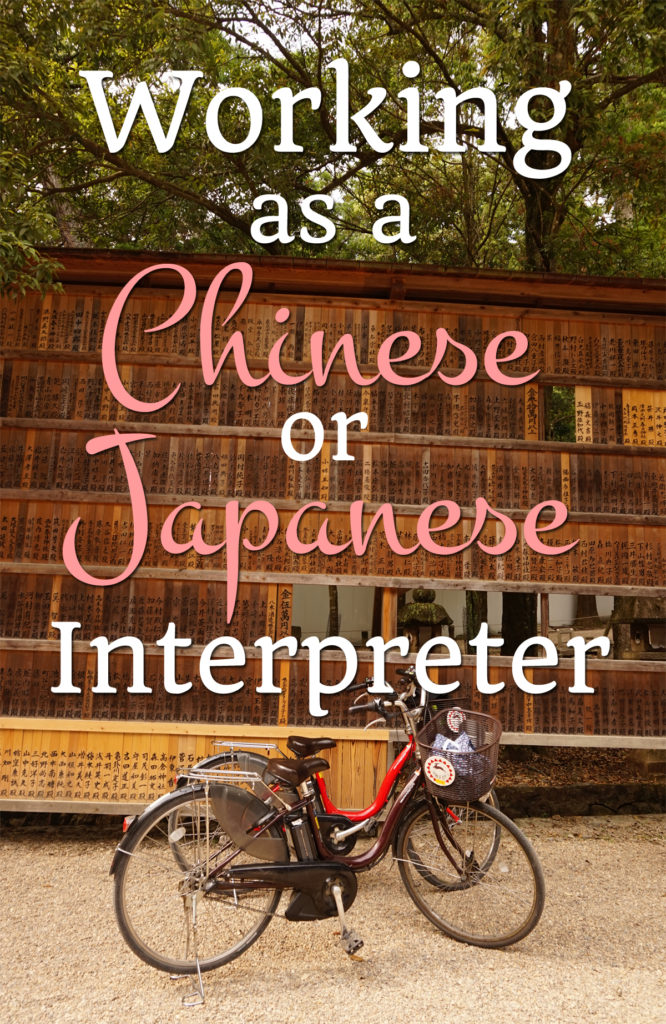The Reality of Working as a Chinese and Japanese Interpreter

Are you considering a career as a Chinese or Japanese interpreter/translator?
Think again. And think real hard.
The Learning Process
I pulled up my collar. I strutted into the hallway, knockin’ down the door as I busted into my first interpreting class. I pulled up a chair next to the fellow Chinese students like a boss. I gave everyone a chin up, just to let them know that this little lady here could speak and read Mandarin. I just passed HSK Level 6 after only 6 months of study, and although I had lived in China for only two years I could pay my own bills, find an apartment, make friends and date the locals all without a translator. I was the shit.
Then, it happened.
I lost face.
Oh no, I didn’t just lose face… I felt like I had been shot down by multiple rounds of language bullets from the interpreting firing squad.
The instructor played the State of the Union speech by Obama and, he said, you’re not allowed to take notes. After playing the video for five minutes, he called on a Chinese student to immediately interpret said speech into Chinese.
The student interpreted it in perfect Mandarin–all without a stutter.
My jaw dropped to the floor.
The instructor resumed the video and I could feel my hands starting to sweat. If he calls on me, I’m going to crap my pants. I don’t know the word for deficit. I don’t even know how to say recession! Oh god, what’s the Chinese word for FBI??
“Ruo Lan,” the instructor read my Chinese name off the list. “Go ahead.”
I’ll save you the pathetic story of how I completely humiliated myself in front of an army of trained, Chinese assassins interpreters. Five minutes of Obama’s state of the union speech turned into, “Uh, America is great?” followed by my total loss of dignity.
And despite my efforts, I continued to lose face day, after day, after day. This is how I bonded with the other two foreigners in the class, and how we quickly became drinking buddies as we commiserated about our craptastic classroom performance. They both had degrees in Chinese–one even had a Masters in Chinese language, and was shooting for Master Degree number two. Yet we still lost, and lost hard, to the local students.
High-Pressure, Delicate Situations

After dropping out of my Mandarin interpreting program, I was instantly called upon to work as a Japanese interpreter for an advertising agency. You’d think that my traumatizing experience in class would send the message across that, perhaps, I wasn’t meant for this high pressure job–but I took the offer anyway. It was good money at a prestigious company and I was much more confident in my Japanese than Chinese. I’m sure it would be fine.
“Mary,” my CEO told me in Japanese as we faced three other British CEOs at a long conference table. “Tell him he can go to hell.”
Our negotiations to form a fair and stable agreement with our western partners was not going well.
“He thinks that would be disadvantageous for us,” I replied as my CEO’s response. I tried to be diplomatic, but I think my CEO’s expression conveyed his real feelings across the table.
Learning to deal with wild cards (like above) when interpreting was difficult, but by far the most stressful aspect of these long meetings was getting it right. Not forgetting words. Understanding everything.
Basically, think of interpreting as public speaking–but with a wrong answer. As with my case, if I misinterpreted something from my boss or the client, it would not only endanger the relationship between these two parties but also cost my company thousands (or even millions) of dollars.
That’s a lot of responsibility.
Interpreting Work is HARD

Many people think that being “fluent” in a language means becoming an interpreter or translator is a logical next step in terms of career.
While translation is a skill that can be honed with practice and hard work, interpreting requires the inherent ability to make split-fast decisions at the drop of a pin. Interpreting is instant word recollection, sentence composition and damage control (which you need if you forget how to say a word/phrase) all balled up into a one second decision making process. It’s not easy.
So no, being fluent (even extremely fluent) in a language does not mean you automatically qualify for interpreter status.
Qualifying for interpreter status means thinking fast on your feet. Real fast.
The Perks of Interpreting

Interpreting is not all doom and gloom. Despite my initial struggles as a Japanese interpreter, as I became more familiar with my industry (and also the specialized words) the clients and staff, I started to thoroughly enjoy my work. Being an interpreter rocks because…
- Interpreting is stimulating. Everyday your abilities are tested and there are constant challenges. Basically, you’re never bored. To prep for your interpreting you’re constantly learning new words (and thus new material and information), which actually makes interpreters very well-rounded and knowledgeable people.
- Flexibility. Most interpreters go freelance and can work whenever and however they please after they build up a client base. It also helps that these jobs pay…
- Big bucks. Interpreters with a good reputation are guaranteed to make decent money. I was once offered 2,000 dollars to interpret at a conference for two days (I didn’t take it, but still)… Not bad.
- Robots probably won’t take over your job anytime soon, like with translation. While google translate is gettin’ there with text, interpreting is an entirely different ball game. I give robots at least another 80 years until they can fully replace a human for interpreting (especially languages like Japanese where the grammar is so completely different to English).
- If you’re like me, you need some human interaction. Translation is a very solitary and lonely job, so interpreting was a better fit for me because I got to meet new people and socialize with my clients.
Drawbacks of becoming an Interpreter

- As I wrote up there, it’s really damn hard and not everyone can do it.
- Becoming a really good interpreter usually requires training. I attempted to go to a Chinese school for interpreter training, but going to school in China was a huge mistake. If you want to tackle interpreting as a career, I suggest you study at the Monterey Institute in Monterey, California. Top ranked interpreting program in the USA (and also costs $$$$$).
- Finding in-house jobs (like mine at the Japanese ad agency) are difficult since most interpreters are hired as freelance. Freelance is nice and flexible, but building up that initial client base is very hard and requires self-discipline.
- For Chinese-English interpreters, there’s a lot of supply but not enough demand. As I wrote above, there’s a huge pool of Chinese students who can speak way better English than you will ever speak Chinese. Competing with these mainland interpreters, who usually take a lower rate, is tough indeed. Other language combinations with Mandarin, such as Chinese-Greek or Chinese-Arabic or Chinese-Russia will probably be much more in demand.
And Finally: Why Did I Leave The Interpreting Field?
As I was interpreting for my CEO for the millionth time, it finally occurred to me:
I haven’t voiced my own opinion or participated in any creative, thought-provoking solutions for almost two years. All I do is translate other people’s words and interpret them in a speech. I don’t have my own voice.
The more I thought about my entire life being used as a mouthpiece for someone else, the more I realized:
Dammit, I want someone to interpret for me. I want to make the big decisions. I want to think of the creative solutions. I don’t want to be a medium. I want to be the content. I want to be the boss.
And thus, I’m currently studying foreign policy in graduate program.
Tips for the Would-Be Interpreter

Ok, if all of my horror stories didn’t frighten you away from the industry, then you must really be serious about this.
- My thread on Chinese-Forums is a must-read for all wannabe interpreters
- The core of becoming a good interpreter is practice. Practice note-taking and practice interpreting at home. This means listening to speeches in your A or B language for 5-10 minutes, interpreting said portion (I would always record myself doing this) and critique yourself for improvement while writing down/memorizing vocabulary from the speech you didn’t know
- If you’re looking for speech materials in English or Japanese, this Ninja/Interpreter has a blog with great practice material
- For resources, accredited interpreting schools (don’t go to the Shanghai one) and other information, visit the Association of International Conference Interpreters.
Anybody have an interpreting story they would like to tell? Or translation? Any comments or questions for interpreting?
29 thoughts on “The Reality of Working as a Chinese and Japanese Interpreter”
I think I started empathy sweating while reading about Obama’s speech. That’s brutal!
Can’t wait to see what you do as your own boss. Especially when you correct the interpreter: “That’s NOT how you tell him to go to hell! This is how you do it…”
Hahaha empathy sweating… Aw, no one has ever empathy sweat(ed)? for me before! I’m so touched.
Yeah, hopefully I’ll be a badass enough leader/politican/whatever to tell someone to go to hell with an interpreter. Man, so cool! Motivation for me to study harder…
I think your thread on c-f.com is still the most baller thread on TI education anywhere! It’s the thread I wish I had before I went to school for it! How are you liking your current role as grad student though? ;D
My thread on c-f.com is only baller because you are such an awesome contributor to it! I wish that thread was around when I started on my journey to be an interpreter, too, because it might have strayed me from the path haha.
I love grad school, this program is amazing and the professors are mind-blowing–however, the work load is awful. I definitely put more than 80 hours per week into homework/class (or more). It’s much more brutal than working! Good god! Paying tens of thousands of dollars to suffer, haha… grad school students are true masochists.
Still enjoying China? 😉
OMG, I cannot believe they expected you to translate that much of Obama’s on a dime! As much as I’m fluent in Mandarin, I know my performance as an interpreter would surely be quite craptastic. 😉
Yeah that was one reason I didn’t like the school. I thought to myself: There’s no way I would be called to interpret out of the blue without knowing ANYTHING about what I was interpreting! If I had a day to prep or something I would have done better, but in the program they just threw random videos out to us everyday and it was so awful.
Being good at Mandarin is good enough! TBH I wasn’t a very good interpreter either (especially in Mandarin); but the longer I took the program I realized this was determined more by innate ability and not language proficiency.
Thanks for comment!
I feel like interpreting is one of the hardest and most undervalued jobs (not necessarily in terms of salary, but people tend to think anyone who’s fluent in another language can do it).
Our teachers always told us to find a hobby where you create stuff because professionally you’re just a medium, like you said (I studied translating/interpreting until I quit because I’m just not made out for this job).
I totally agree with you Ruth… interpreting is really hard. People that have never studied a foreign language don’t even fathom how hard interpreting is; like you said, they assume that if you speak language x, then you can do interpreting. It’s WAY more work than that! I have mad crazy respect for simultaneous interpreters. It’s an art.
I think interpreting (like most everything) is suited for certain types of people. I definitely think creative types would suffer in this type of work.
Glad we both found the light and quit interpreting/translating! Haha.
One of my interpretor/translator (did both) friends quit for exactly the same reason as you. Very interesting. I had to do some interpreting/translating in one of my previous jobs and I just found it so boring (which surprised me). Just being told what to say and write on behalf of someone else. Some ‘Big Deal’ employees at ‘Big’ Companies also treat professional interpreters so poorly, it’s just insulting.
Interpreting/translating can get boring, but compared to a lot of other jobs it is quite stimulating. I think interpreting/translating is still very brain-function heavy, although it may not be that creative. And although I was bored out of my mind translating documents about brakes/steel manufacturing/cotton production/metal welding etc… I realized later that: wow, I know a lot about all these industries thanks to my translating jobs. It helped broaden my prospective.
I agree with you on interpreters being treated like crap. Again the “if you speak a foreign language you can interpret” type mindset is the root of this I think.
I also studied translation and interpreting, I had a subject on interpreting but as I chose the translator path I didn’t really get to study simultaneous, I only did consecutive.
I did a bit of interpreting in my previous job but it was a very laid back atmosphere, where I would not only interpret in meetings but also give my opinions and suggestions, haha. I don’t like interpreting, though, I like translation.
Do you really think robots will do decent translations any time soon? Because if Google Translate is the best option, then I’d think we still have CENTURIES before it can translate half as good as a real person! I think we will need to create robots with conscience first!
Google translate is pretty horrible, although my Chinese friends were saying lately it’s improved immensely (haven’t used it in a while). I don’t know, technology is happening so fast so I don’t know how advanced the world will be, but I do think *at least* 80 years is necessary for us to even come close to human-level quality of translations. Most people who say google will takeover translator work are NOT translators so they have no idea what they are talking about, haha. However, we are going to get driverless cars soon (ish?) and thus the day may soon come when translators are also replaced (wah!).
It’s useful to check single words, but try to put a whole paragraph there! Also, it seems all the translations use English as a middle language, so if I want to translate Spanish to Chinese the route for Google Translate will be Spanish – English – Chinese, which increases the probability of errors, haha.
Maybe I’m so skeptical about machine translations doing a goog job at some point because many of the things I do require creative translation. But yes, I read an article a few weeks ago saying that in 100 years ALL jobs will be done by robots! So let’s see. At least translators will not be alone in the unemployment benefits queue xD
When I was still learning Japanese in high school and college, I thought I might like to translate video games from Japanese to English. But then I got to Japan and realized that even simple translation is hard, even when you know the language. Japanese is so complex and ambiguous that translating that to a direct language like English is horrifyingly hard. At a TEDx event in Japan, I was a volunteer and my job was to interpret for the guest speakers. My job was nothing compared to the two people in the booth interpreting the speeches live for the audience members wearing earbuds. I was in awe of them. Also, I learned a lot about myself after teaching in Japan, most importantly that I need lots of alone time. So no interpretation for me. And it’s probably a good thing I never invested in translation courses. Koreans are so good at English that they will probably never pay a white person to interpret for them! I’m glad you are going for a new goal! You will make lots of positive change!
I also wanted to be a Japanese video game translator, but what threw me off wasn’t the difficulty (and it was difficult, that’s for sure), but the PAY! One of my dream companies offered me a job, but the pay was so abysmal I straight up told them I couldn’t survive on that salary. They told me to get lost and they paid some other sucker to do it.
Interpreters have a really, really hard job. I do think they are under appreciated and my heart goes out to them!!!
Thank you for the support!! I hope I can make some great change, sigh, it’s hard!
What Ive found in Japan is that they usually want/use a “halfu” or Japanese who have lived abroad and return to do all the interpreting for them. I would prefer to deal with somebody like you who also thinks in English, as we know that is very important, but most of the translators Ive had to deal with think in Japanese and speak in a very adolescent manner to the English client, kind of neither yes or no feeling, just ambiguous bullshit to leave you with a no, so allot can get lost in the translation. I can understand most of what the native Japanese speaker is saying anyway, but as we all know, its best sometimes not to reveal that or you will end up just pissed off with some annoying circle logic answer. These days I just go straight into the English and cut out all of that. If the speaker knows the translator is Japanese, it might circumvent some of that nonsense, but not always because the translator usually sides with the Japanese speaker (part of that wet feeling family crap) So I find it rare to find a born and bred abroad native English speaker working as a translator for Japanese. Your loyality is with the client of course, but sometimes the English speaker really suffers in all this. Once it gets hijacked, I can stop it but usually go through the translator as not to upset the bullshit “wa” feelings and let them do the heavy lifting for me, that is keeping the bullshit circle jerk logic in check. Japanese are a pain to deal with; I prefer not to for these very reasons. Just a simple request turns into a nightmare and the more Japanese you speak the worse it gets unless a translator is involved to keep the speaker in check by making them look stupid.
When I was an interpreter, I could tell that my western clients really liked working with me and we built up a good relationship. Hell, even the hong kong clients liked me. I can see how working with a Japanese interpreter would be harder–a lot of interpreters I met in my program were very stiff and, despite their language skills being out of this world, they were still very culturally unaware.
Surprisingly, my Japanese employer liked me too. I think they appreciated having a foreigner around that didn’t have a stick up their ass. I don’t know about you, but some Japanese people loosen up A LOT around foreigners because they aren’t socially required to do all the mumbo-jumo respect crap. Keigo goes out the window and they can actually open up. I think I was an outlet for a lot of Japanese staff and they appreciated it. I also loved them, too. I’m not a fan of Japanese companies, but the place I was employed as an interpreter was a very, very good place. My Japanese bosses invested in me and cared for me and I was truly touched. When I quit I tried to find a replacement for them, but they all told me: “Mary, no one can replace you. Honest to god.” It’s hard to find a foreigner that speaks baller Japanese and can put up with Japanese company/culture–usually you’re stuck with a stiff Japanese person that speaks English but can’t build human relationships.
Same goes for Chinese interpreters too.
So, who knows, maybe foreign itnerpreters that speak these crazy Asian languages are more employable because westerners prefer to deal with them than some stiff Japanese/Chinese person that doesn’t get the culture.
Its good you found a place that respects you, that can be gold in Japan.
“but some Japanese people loosen up A LOT around foreigners because they aren’t socially required to do all the mumbo-jumo respect crap”
Agreed, but that can go another way. For example, they might bring out the goofy when you want to be serious. Ive got that allot and its very annoying. Not a junkie for that anymore; I prefer just respect you get from the same culture. Ive seen westerners get hooked on that, changing lanes as it suites them. Dont realy find that real anymore, but I guess if your in a certian enviroment you might find it helpful to change lanes occasionally. But there are aspects of Japanese culture that have a lane I like and can stay in, like in some applications I think soft or grey mutual feelings can go a long way, instead of the more hard logic you find in the West.
and if I might add+
“Dammit, I want someone to interpret for me. I want to make the big decisions. I want to think of the creative solutions. I don’t want to be a medium. I want to be the content. I want to be the boss”
Then dont come to Japan. Its in the cards, the folds, written between the lines that gaijin shall not be a boss but rather a tool for Japan Inc. a gig doing this or that, thats acceptable, thats ok. You in charge? that aint happening unless you open your own school or an expat GM from abroad etc. Up and up local hire gaijin? thats a good joke. They are out there, but very rare.
What do you have against Japan? I don’t know your background, but unless you are Japanese, no-one is forcing you to make it such a key part of your life.
Yeah, it’s true. But that’s why when foreigners take over management of Japanese companies (like with Nissan) it’s just divine. A foreigner goes in, fires everyone, starts to put in western methods of work ethic/flow, and bam–company becomes more profitable.
This is one reason I left Japan. I knew as a foreigner it would be really, really hard to move up in the company (and honestly, it would be hard for me to survive in the company with the culture clash), so I left. Although I do have to say, I have some friends that work for more open-minded Japanese companies and they are quite happy. I have a translator friend that translates law cases and other law documents for a really high-end law firm and she is happy as a clam. She gets good pay/benefits and doesn’t work overtime. So I guess if you find a sweet gig like that, then maybe Japan can be bearable. Again, this is not common but it’s not impossible.
Yeah but a translator is not really a sei shain, (or is she?) Even if she is, its a sort of bridge position, meaning she has some protection from the groupism conformity that can crush somebody. She can go in and out of each world. The sempai and other “leader” cant touch that, and are terrified as they might loose face. I think we discussed this in another post (hard skills vs soft skills). She has a skill the others dont and probably cant obtain, so they have to leave her alone. She is in a position to bully or pull the language trump card. That gets you respect in a bully or get bullied binary logic culture like Japan. Yes, a sweet position to be in, indeed!
forgot to add+
“Yeah, it’s true. But that’s why when foreigners take over management of Japanese companies (like with Nissan) it’s just divine”
Hmmm. agree and disagree. Having experienced that, please allow me to share. Of course, having a foreign director is good; theymight have empathy towards you as both of you are foreigners in Japan, and you dont feel the alienation you would in a pure Japanese enviroment. But, the inside uchi Japanese culture always wins (its one of those commandments that cant be changed or challenged or risk total cut off from the group). It means, smile and coddle the foreign director and visiting staff, but always stay loyal to the “manipulator” Who is the manipulator? Usually a he or she Japanese person who speaks and understand Japanese and English. They are designated or have designated themselves to bridge between the director and the Japanese staff. The Japanese blindly follow this person because of their English ability. The Japanese dont agree with the directors ideas? No problem because the manipulator will take care of that. He / she will smile and make the director warm and fuzzy, all the while working against them, and keeping the J staff in their control, not the directors, but its usually to keep some rule or “fairness” in place, to the Japanese advantage. Ive seen this many times, and being a foreigner step child in between it all makes for allot of stress. Agree with the director? Your not to be trusted. Go against them? He dont trust you. Needless to say, its best to be the director ! )
Just putting out some facts dude. If its uncomfortable for you, I guess I could say lovely sunny things, but thats not my truth, and these are truths that are shared with many people Ive met, who have become my friends as well. Same exact truths, anything to that? or its just that we are all messed up? Maybe we got in too deep? Before you come with your “knowledge”, youve got to get in it, not on the peripherals. If your willing to do that, Id love to build with you, otherwise Its my lane, and where I be at, and I cant connect with you. Take it or leave it ) Now if you got family in it or your part of it racially etc, and your defending, sorry I cant be with that. Cant be a one way deal, that is you wont respect others opinions or culture, but expect others to do backflips for yours.
Dude, I’m asking you what you have against Japan. Not sure what is making you so angry. Not sure where the insults are coming from. And love how you’re trying to insult me based on assumptions about my race and family which you know nothing about. Not sure where you got all that from. No need to get so defensive. I’ve already stated I’m interested in dialogue but seeing as you can’t handle it let’s not waste our time.
What a great post! Full of useful information, personal stories 😛 and practical tips. I love the backstories. Hahahhaa.
Thank you Lani! <3
Interesting read. I started interpreting Japanese to English, and vice-versa about 2 years ago. I hated reading the language (specifically the Kanji) hence I also had a low store of vocabulary. What i found myself really good was my instantaneous response when interpreting (makes me wonder, how much calories can interpreting burn in an hour). I earned a good reputation this way. I’m known as fast and precise. I did feel some dissatisfaction because i sometimes lack the necessary vocabulary to make an articulate interpretation. This forced me into returning to my self-study and learn again. Few months later, I passed the JLPT N1 with flying colors, managed to “renegotiate” my initial salary (i work full-time as an interpreter for a global Japanese company). Quite satisfied with where I am for now.
As for “being a mouthpiece”, i never really felt this. I’ve always been bold regardless of who the speakers are, and i’d even voice out my opinions often. Yes, this got me burned a few times, but they love me all the more for it.
Wow, glad to see you’ve made such a successful career out of interpreting! I’m very impressed with you and glad you’re taking those Japanese skills and putting them to good use.
As for the mouthpiece thing, that may be a bit of hyperbole on my part. There are some creative facets to interpreting and if you really get on well with upper management then they might ask for advice/opinion on occasion, but that’s not your job. I guess I wanted to do work that involves more critical and creative thinking. I knew I was out of practice when I enrolled in graduate school, was asked to write a paper on how Turkey can democratize, and was forced to critically think for the first time in years. Interpreting is critical thinking in its own way (it’s literally transforming an idea in a matter of seconds), but it’s a completely different use of the brain. I know I’m not explaining it well, but those are my thoughts. In summary, I realized that I wanted to be the ones running the company/organization or creating strategic plans rather than be the person interpreting.